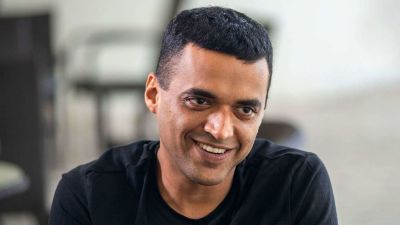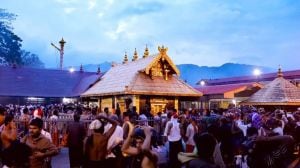An outsider breaks in
Vasundhara Raje, BJP chief ministerial candidate in Rajasthan, is the classic outsider. In a purush pradhan male-dominated society, she is...

Vasundhara Raje, BJP chief ministerial candidate in Rajasthan, is the classic outsider. In a purush pradhan male-dominated society, she is an angrezi bolne wali aurat English-speaking woman. In a state marked by an irritating culture of obeisance, where values are feudal, the 48-year old Sophia College-educated Princess of Gwalior and Maharani of Dholpur aims to become the face of a party that was synonymous for decades with the patriarchal rustic figure of Bhairon Singh Shekhawat.
She8217;s campaigning hard. The evening in Ganganagar on the Punjab border, next morning driving through the crowded Banipark market in Jaipur.
8220;They persist in casting me as a chiffon-clad, polo-playing woman,8221; she says indignantly, 8220;but why don8217;t they go to the field and see how I am being received? I never go to polo matches. First they stereotype you, then they condemn you. Either you have to be mad like Jayalalithaa or Mayawati, or you8217;re projected as some sort of bimbo.8221; Vasundhara has been a conscientious minister of state for External Affairs and recently of Small Scale Industries. She8217;s nursed Jhalawar, her constituency, and won her seat in five general elections. But in socially backward Rajasthan, is she desi enough to become beloved of all Jats, Rajputs and Gujjars?
8220;When we started out, frankly, I thought we were goners,8221; she grins, 8220;but after my Parivartan Yatra, after travelling in the field, I think I8217;m winning.8221;
She faces an angry invisible enemy. Within the BJP, the RSS old guard, represented by former minister Bhanwarlal Sharma and BJP National Treasurer Ramdas Agrawal and others, are known to be deeply resentful of a 8216;convent-educated parachutist from Delhi8217;. Between the RSS patriarchs and Vasundhara, there is a clash of civilisations. When she released the BJP manifesto in the party office, Agarwal couldn8217;t help being critical. 8220;These are the days of glamour,8221; he complained, 8220;there is no focus.8221;
Calculations predict that the division in the BJP will weaken the party8217;s chances. Workers will not be enthusiastic enough to drum up voters. Rebel candidates will reduce the tally of seats. And Gehlot will return as chief minister, albeit with a much reduced margin.
But Vasundhara says she8217;s not overly worried about the anger of the Sangh gerontocrats. 8220;I try and win them over with affection and respect. I8217;ve been to their homes. I may be a modern woman, but I8217;m also traditional. Women face an uphill battle in every party, not just the BJP. I mean,8221; she shrugs, 8220; look at the way the uneducated louts freaked out over the Women8217;s Reservation Bill! They just couldn8217;t believe that Parliament would suddenly be full of dames!8221;
Dressed in a blue chiffon sari, sindoor at its conspicuous best, hair neatly pinned and nails immaculately filed, Vasundhara is not half as captivating in Hindi as she is in English. In English she8217;s witty and self-deprecating. In Hindi, she sounds awkward as if she8217;s always pulling herself back from some terrible grammatical error. 8220;Ham benefit karenge,8221; she shouts to an an audience of unemployed youth, 8220;both individually and collectively.8221; A local TV channel smirks that when she started her campaign, they couldn8217;t air her interviews because there were so many English words in her speech.
But language isn8217;t her only dilemma. During the Roop Kanwar incident, sections of the BJP hailed sati as Bharatiya sanskriti. Can she really identify with a party that defends sati? Over lunch of chapatis, vegetables, her favourite idlis, delicately set out on a thali, she is unsure of her answer.
She says she believes in individual choice, but also provides an aggressive defence of parampara. 8220;If you want to commit sati and voluntarily jump on the flames, there8217;s nothing anyone can do to stop you. But it should not be forced.8221; Although there8217;s awful gender bias in politics, she feels she can change things: 8220;Never underestimate a Jat bahu.8221;
She keeps up a punishing schedule at night, driving through crowded mohallas, flood-lit markets and flag-decorated alleys, steadfastly refusing sweets 8220;I8217;ve put on far too much weight, no time to exercise8221;. She shudders when local party workers say that they want to weigh her in blood. 8220;Go ahead, but please don8217;t let me see it,8221; she quavers.
In the crowded depths of the walled city, she reveals that she8217;s still centred on her family. 8220;Meri ma kehti thi, rajniti sirf sar se nahi, dil se ki jaati hai My mother said politics comes not only from the head, but also from the heart.8221; Back in the car, she says she misses her mother and brother. 8220;My brother would always call and say, I8217;m proud of you, you8217;re doing well. From him I learnt that you can never be condescending to a crowd but also never too familiar.8221; Madhavrao was a natural politician but she lacks his instant charisma. Bubbly and warm in private, her presence doesn8217;t seem large enough or rural enough to sway a Rajasthani mob.
She didn8217;t want to come to Rajasthan. 8220;I was happy where I was, I loved my job.8221; But now much like a dutiful political daughter she seems to have applied herself to the task doggedly. During her Parivartan Yatra, she toured 190 constituencies, effected costume changes and worked on her Hindi. She almost abandoned the race after her candidates didn8217;t get tickets but grit her teeth and fought on. 8220;They the RSS old guard don8217;t realise that I was brought up in politics from a young age. They also know that if I win, I8217;ll stay. That8217;s why they8217;re afraid.8221;
Vasundhara Raje may be a misfit in Rajasthan, but she8217;s not afraid. She says she8217;ll prove the pollsters wrong. On result day, she8217;ll 8220;sleep like a log8221;, then head to the temple of Tripurasundari in Banswara to wait for the verdict. She may be an outsider in Rajasthan8217;s BJP, but her influence has grown more than her critics care to admit.
- 01
- 02
- 03
- 04
- 05






























